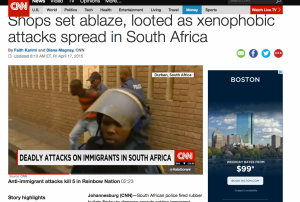Xenophobia a Scourge and Scapegoat felt by all immigrants also impacting LGBT refugees
By Melanie Nathan, April 17, 2015.
 The sordid side of South Africa, reared its ugly head this past week, as Xenophobic mobs attacked foreigners and immigrants, causing at least 5 deaths in the Durban area. This brewing inferno, which spread to other cities, is a far cry from the proud Rainbow Nation, birthed from Apartheid’s scourge and may result in South Africa being that “Skunk-Nation” Nelson Mandela so avidly sought to avert.
The sordid side of South Africa, reared its ugly head this past week, as Xenophobic mobs attacked foreigners and immigrants, causing at least 5 deaths in the Durban area. This brewing inferno, which spread to other cities, is a far cry from the proud Rainbow Nation, birthed from Apartheid’s scourge and may result in South Africa being that “Skunk-Nation” Nelson Mandela so avidly sought to avert.
Lest we forget the former South African President Mandela’s own words, where in his inaugural speech he implored:
“Never, never and never again shall it be that this beautiful land will again experience the oppression of one by another and suffer the indignity of being the skunk of the world.”
CNN Report:
South African police fired rubber bullets Friday to disperse crowds setting immigrant businesses ablaze as attacks against foreigners spread to Johannesburg.
Chanting and singing, machete-armed residents burned down shops owned by foreigners, including a Nigerian dealership in the nation’s largest city.
Immigrants carrying bricks accused police of not doing enough to protect them as businesses smoldered.
Violence targeting immigrant shops started recently in the port city of Durban, where two foreigners and three South Africans were killed. Residents have accused African immigrants of taking their jobs and committing crimes. The unemployment rate in South Africa is 25%, according to government figures.
President Jacob Zuma slammed the assertion, saying his government is addressing social and economic issues brought up by citizens. He said immigrants contribute to the nation’s economy while others bring scarce skills.
“While some foreign nationals have been arrested for various crimes, it is misleading and wrong to label or regard all foreign nationals as being involved in crime in the country,” Zuma said.
As the violence spread to other cities, terrified immigrants sought a resolution. Others fled, taking refuge at police stations in major cities.
“They are using this as scapegoats,” said Jean-Pierre Lukamba, an immigrant from the Democratic Republic of the Congo.
“Every day, migrants are living in this fire. It’s not just attacks. It’s institutionalized xenophobia. The government must do something. Those people aren’t just mad for no reason. They want electricity, they want jobs, they want water.”
South Africa has served as a beacon to immigrants and refugees migrating from poverty-stricken countries in the North, as well as an imperative place of refuge for LGBTI people from the Northern countries which criminalize homosexuality.
At African HRC we have been dealing with the ramifications of this Xenophobia on LGBT refugees who arrived in South Africa in the hope that the Constitution, which includes sexual orientation and gender identity equality, would protect them from the homophobia they had escaped. Instead, however, these refugees have found that not only did the homophobia follow them to South Africa, but their persecution was exacerbated by extreme Xenophobia.
We have managed to resettle a gay man from Democratic Republic of Congo in San Francisco. He had first tried to seek refuge in South Africa, where he was terrorized and persecuted by police, blackmailed by a landlord, was unable to find work, and even refused accommodation by the local LGBT shelter. Eventually he was able to receive a mandate for resettlement by UNHCR which recognized the discrimination and danger in South Africa and helped him to resettle here in the U.S.A. (Junior’s story)
Another example is the terrifying journey of an Angolan lesbian couple who, after extreme persecution in their home country, had first tried to make South Africa their home, but were further persecuted by extreme Xenophobia, even within the LGBT community itself. Mari and Cara finally made their way to San Francisco where they are applying for asylum and will actually be getting married today. (Mari and Cara’s story.)
A South African activist commented that not since the Apartheid era 80’s has she seen such turbulence in South Africa. People are very concerned. Foreign governments have been looking at ways to evacuate their citizens, many of whom are now seeking refuge in camp like situations under police protection for fear of returning to their homes.
I place the blame for this squarely on President Zuma’s failed leadership and the culture of corruption he has fostered. The unemployment rate has been between 25 to 37% for far too long, with very little being done to change the intrinsic damage of the Apartheid era. There have been constant electrical blackouts due to lack of power and people are still denied basic amenities. People are dissatisfied. As the masses continue to maintain loyalty to the ANC, the party of Mandela and Zuma, immigrants have become the perfect scapegoat. Loyalty couched in terms invoking “past struggle” has rendered South Africans unable to target the real cause of the unemployment and struggle to survive, and rather than topple Zuma and his corrupt team of thugs, it is far easier to scapegoat and blame disenfranchised foreigners.
The anti-immigrant attacks of 2008 did not seem to change much. One can only wonder if this deflection by the masses to focus blame and attack foreigners rather than their own government actually plays into Zuma politics. Nonetheless whichever way one chooses to look at this, the bottom line is that until such time as South Africans look to the real culprits – the Zuma regime and do something to change their leadership, they will indeed be kissing their “Rainbow Nation” designation goodbye, while signing up, yet again, for “Skunk Nation.”
READ MORE and see Video